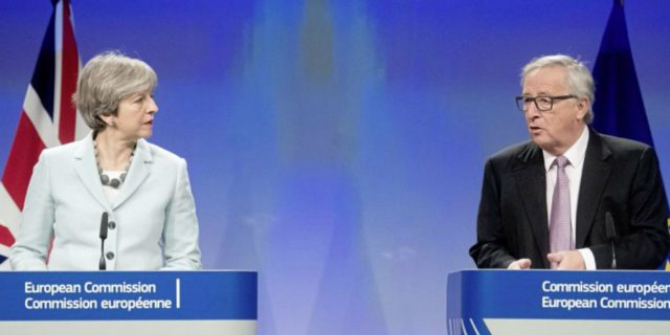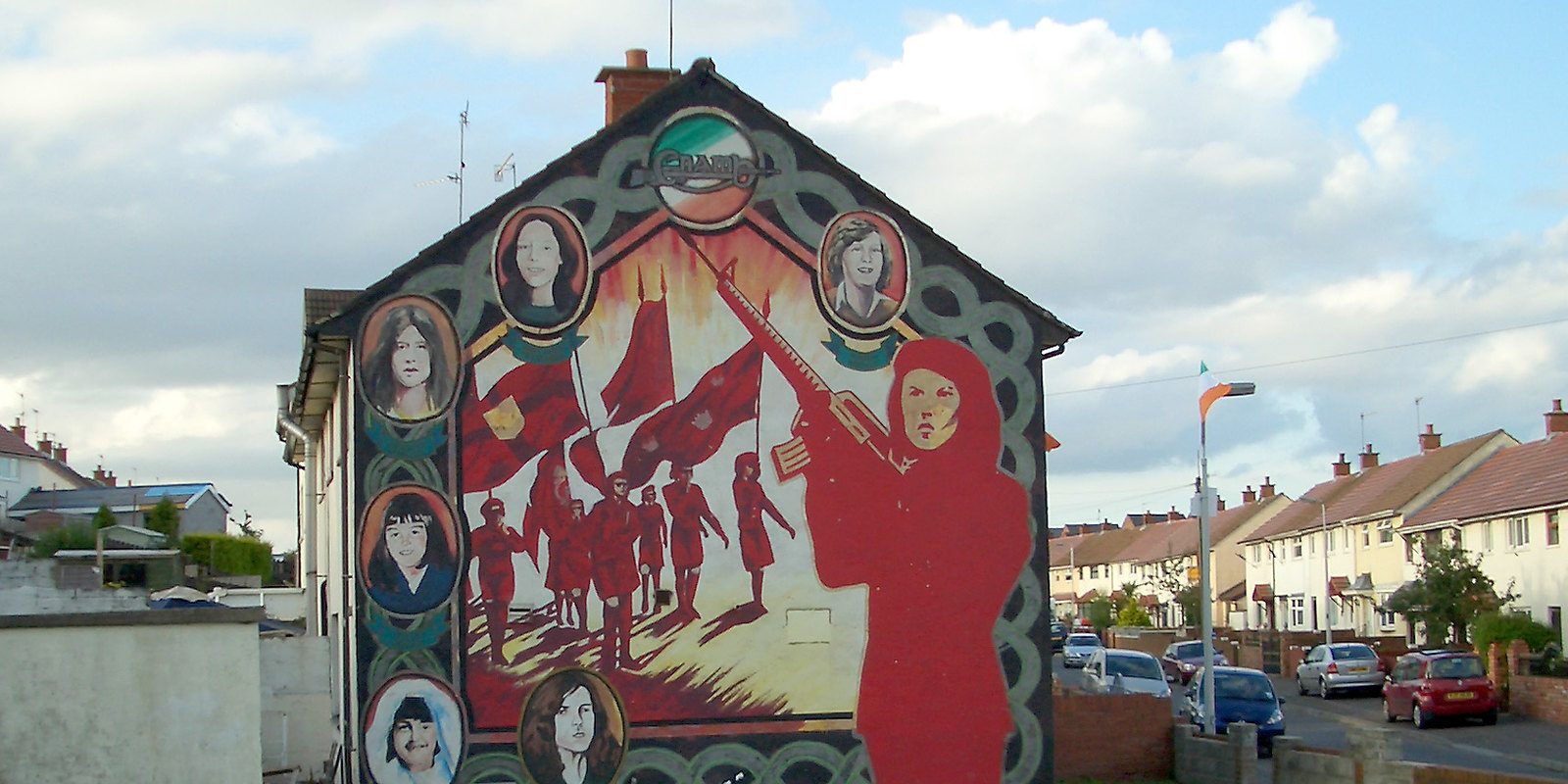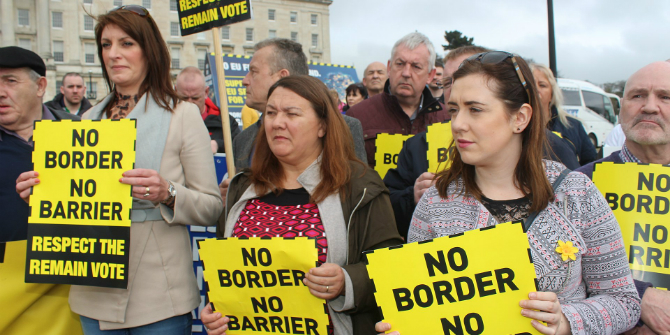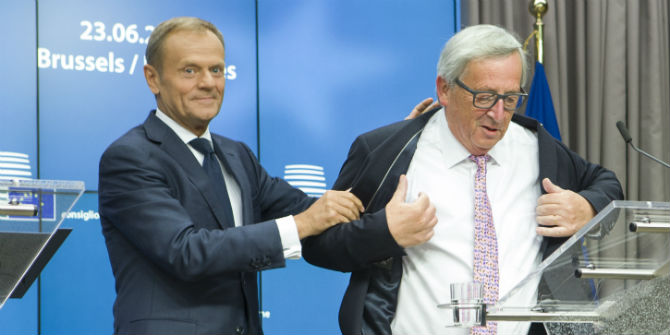 When it comes to Brexit, there’s no doubt that UK negotiators have adopted a hard bargaining strategy. Benjamin Martill asks whether this is the best strategy for advancing British interests.
When it comes to Brexit, there’s no doubt that UK negotiators have adopted a hard bargaining strategy. Benjamin Martill asks whether this is the best strategy for advancing British interests.
The New Politics of Bargaining
All eyes in British politics are on the negotiations between the UK and the EU over the terms of the forthcoming British withdrawal from the Union, or Brexit. Surprisingly, questions of bargaining strategy – once the preserve of diplomats and niche academic journals – have become some of the most defining issues in contemporary British politics.
Cabinet disagreements over the conduct of the negotiations led to the resignation of David Davis and Boris Johnson in early July 2018 and the issue continues to divide the ruling Conservative party. Theresa May’s most recent statements have all addressed the question of how hard she has pushed Brussels in the talks.
But is the hard bargaining strategy appropriate, or will it ultimately harm the UK? The salience of this question should occasion deeper analysis of the fundamentals of international bargaining, given the extent to which the course of British politics will be determined by the government’s performance (or perceived performance) in the Brexit talks.
 Photo by Tiocfaidh ár lá 1916 via creative commons
Photo by Tiocfaidh ár lá 1916 via creative commons
Driving a Hard Bargain
A hard-bargaining strategy isn’t necessarily a poor one. To the extent it is workable, it may even represent the sensible option for the UK.
Hard bargaining is characterised by negative representations of negotiating partners, unwillingness to make concessions, issuance of unrealistic demands, threats to damage the partner or exit the negotiations, representations of the talks in zero-sum terms, failure to provide argumentation and evidence, and withholding of information. From diplomats’ portrayal of the EU as an uncooperative and bullying negotiating partner to a set of demands recognised as unrealistic in Brussels and Britain alike, the UK’s approach to the Brexit negotiations scores highly on each of these measures.
The consensus in the academic literature is generally that hard bargaining works only where a given party has a relative advantage. Powerful states have an incentive to engage in hard bargaining, since by doing so they will be able to extract greater concessions from weaker partners and maximise the chance of achieving an agreement on beneficial terms.
But weaker actors have less incentive to engage in hard bargaining, since they stand to lose more materially if talks break down and reputationally if they’re seen as not being backed by sufficient power,
So which is Britain?
The Power Distribution
The success of hard bargaining depends on the balance of power. But even a cursory examination would seem to confirm that the UK does not hold the upper hand in the negotiations. Consider three standard measures of bargaining power: a country’s economic and military capabilities, the available alternatives to making a deal, and the degree of constraint emanating from the public.
When it comes to capabilities, the UK is a powerful state with considerable economic clout and greater military resources than its size would typically warrant. It is the second-largest economy in the EU (behind Germany) and its GDP is equal to that of the smallest 19 member states. And yet in relative terms, the combined economic and military power of the EU27 dwarves that of the UK: the EU economy is five times the size of the UK’s.
Next, consider the alternatives. A ‘no deal’ scenario would be damaging for both the UK and the EU, but the impact would be more diffuse for the EU member states. They would each lose one trading partner, whereas the UK would lose all of its regional trading partners. Moreover, the other powers and regional blocs often cited as alternative trading partners (the US, China, the Commonwealth, ASEAN) are not as open as the EU economy to participation by external parties, nor are they geographically proximate (the greatest determinant of trade flows), nor will any deal be able to replicate the common regulatory structure in place in the EU. This asymmetric interdependence strongly suggests that the UK is in greater need of a deal than the EU.
Finally, consider the extent of domestic constraints. Constraint enhances power by credibly preventing a leader from offering too generous a deal to the other side. On the EU side the constraints are clear: Barnier receives his mandate from the European Council (i.e. the member states) to whom he reports frequently. When asked to go off-piste in the negotiations, he has replied that he does not have the mandate to do so. On the UK side, by contrast, there is no such mandate. British negotiators continually cite Eurosceptic opposition to the EU’s proposals in the cabinet, the Conservative party, and the public, but they are unable to guarantee any agreement will receive legislative assent, and cannot cite any unified position.
Perceptions of Power
But the real power distribution is not the only thing that matters. While the EU is the more powerful actor on objective criteria, a number of key assumptions and claims made by the Brexiteers have served to reinforce the perception that Britain has the upper hand.
First, on the question of capabilities, the discourse of British greatness (often based on past notions of power and prestige) belies the UK’s status as a middle power (at best) and raises unrealistic expectations of what Britain’s economic and military resources amount to. Second, on the question of alternatives, the oft-repeated emphasis on ‘global Britain’ and the UK’s stated aim to build bridges with its friends and allies around the globe understates the UK’s reliance on Europe, the (low) demand for relations with an independent Britain abroad, and the value of free trade agreements or other such arrangements with third countries for the UK. Third, on the question of domestic constraint, the post-referendum discourse of an indivisible people whose wishes will be fulfilled only through the implementation of the Brexit mandate belies the lack of consensus in British politics and the absence of a stable majority for either of the potential Brexit options, including the ‘no deal’, ‘hard’, or ‘soft’ variants of Brexit. Invoking ‘the people’ as a constraint on international action, in such circumstances, is simply not credible.
Conclusion
Assumptions about Britain’s status as a global power, the myriad alternatives in the wider world, and the unity of the public mandate for Brexit, have contributed to the overstatement of the UK’s bargaining power and the (false) belief that hard bargaining will prove a winning strategy.
Britain desperately needs to have an honest conversation about the limits of the UK’s bargaining power. This is not ‘treasonous’, as ardent Brexiteers have labelled similar nods to reality, but is rather the only way to ensure that strategies designed to protect the national interest actually serve this purpose. Power is a finite resource that cannot be talked into existence. Like a deflating puffer fish, the UK’s weakness will eventually become plain to see. The risk is that before this occurs, all bridges will be burned, all avenues exhausted, and all feathers ruffled.
This post represents the views of the author and neither those of the LSE Brexit blog nor of the LSE. It first appeared on the Dahrendorf Forum blog.
Benjamin Martill is a Dahrendorf Forum Post-Doctoral Fellow at the London School of Economics.







Thank you, Benjamin Martill, for your clear and concentrated appraisal – applying, most refreshingly, to the present.
Rubbish from a kid that doesn’t look like he is shaving yet!
The U.K. had taken a pragmatic approach to find the most sensible avenue and outcome.
The power arguement is demeaning to the U.K.,
The writer does not have Experience of life in a business world.
Firstly it will amaze you that politicians often have spats and when the dust settles they walk arm in arm as if nothing ever happened.
That’s because it’s a game!
The U.K. has many trump cards to play, as do Europe.
But essetisllly we do not have to buy German cars French wine European products at inflated tariff prices.
Given the trade gap, it is they that need to tell us what they will do in exchange for our money!
If they are not willing to take our money, we spend it elsewhere! And there’s a queue of countries wanting it!
This negotiation is not about trade anyway. It’s about protecting the gravy boat.
Ensuring that countries do as they are told by the unaccountable beurocrats.
Ask Italy ( deficits)
Ask Greece ( bankrupt )
Ask Hungary ( asylum )
Ask Poland ( pensions )
Check out all of these countries issues with the EU.
Counties that revolt are brought back in line by the European Court of Justice.
They have lost control of their economies, their laws and their borders.
Seriously fundamental issues
Out means out!
@ Dennis: “Rubbish from a kid that doesn’t look like he is shaving yet!” you aren’t seriously suggesting that competence to write about the EU is based on testosterone levels, are you?
“Ask Italy ( deficits)
Ask Greece ( bankrupt )
Ask Hungary ( asylum )
Ask Poland ( pensions )”
In all these countries I believe there is still widespread support for staying in the EU, including in the governing parties. A major factor in the whole negotiation is, in my opinion, that many of the negotiators would like to keep it that way. That means that they don’t want the UK to be seen to have left without paying a significant price, as otherwise others will join the rush for the exit.
About now, according to various prophecies made by Leavers before the referendum, we should be seeing German car manufacturers and Italian prosecco makers queuing up in Brussels to demand the EU make concessions to ensure frictionless trade after Brexit. This doesn’t seem to be happening. I can only assume that they also don’t want to risk the EU falling apart.
Alias
Surely you don’t mean to suggest that the EU would fall apart if the U.K. got a good deal do you??
If it is going to fall apart it would be because of its dictatorial attitude to its members, it’s out of control gravy boat budgets, it reluctance to accept democracy, its reluctance to recognise sovereign states, it weak currency, built on straw, its closed doors, its illegal cartel, its failure to deal with immigration, its open doors borders, its terrorism failures( linked), its desire to be a superstate with no proper democracy,
It’s attitude of punishment for any state that doesn’t do as its told,
I could com up with many more if I had 30 seconds to spare.
@Dennis, you wrote “Surely you don’t mean to suggest that the EU would fall apart if the U.K. got a good deal do you??”
You don’t have to put a smiley on that. For some reasons you list, and some others you don’t, it is obvious to almost everyone with two brain cells, and there are quite a few of those in the EU27, that the EU is facing a lot of major problems, many of which it hasn’t yet found answers to. It can probably cope with the UK leaving. If however some other big richer countries, such as Italy or France, were to leave, that could place an unbearable strain on the whole structure. Even now that is, with the political situation in both countries, not inconceivable. If the UK were seen to be doing well out of Brexit, it could become likely. The EU negotiators, and anyone else supporting the European project, will very much want to prevent that.
Maybe you disagree. But then why aren’t German manufacturers putting massive pressure on Brussels to do a deal? I’m sure they would like to keep open access to the UK market, but they also don’t want any other countries to leave.
Alias
The smiley was because it was tongue in cheek.
You are right, the mass immigration being suffered by the Mediterranean countries has not been solved, I have said elsewhere that they take a ostrich approach, where in my view the problem is solved easily. Only though when you recognise what the cause of immigration is.
Wars yes.
But today’s potential immigrants have an iPhone and 3G before the roof is fixed.
They can see for the first time how rich the EU is,
They want it and who can blame them?
Fix their poverty and you fix the mass immigration.
Put the fire out at the scource.
Insofar as Germany is concerned, they are indeed concerned, no they are in full blown panick.
But one must always keep a straight face when playing poker, they don’t do what this country does, they are much more experienced in business negotiations than the populous and the press of this country.
We must hold our nerve, mean what we say and say what we mean.
Freedom?
I cannot begin on this blog to explain how business live in fear of speaking out in certain fields of anticompetitive behsviour, because without judicial judgment you are out of business.
Not for operating a cartel, but even discussing it!
Even if it’s a reasonable question to ask.
When did we vote to loose our freedom of speech in this country?
Tip of the iceberg.
This is the bloc that actually are a cartel themselves.
Maybe you can see why I voted out, not because I believed any politicians, but at my age I can tell when they lie. Their mouth opens!
Not just the leave but also the remain.
I do wish the disruptive remainers would stop saying I did not know what I voted for. Yes I bloody did!
But I will admit than many were tsken in.
But I was taken in my Tony Blair with his lies, promises and and deceit.
I have before today been disappointed at certain elections. Some quite close results.
I haven’t demonstrated in London shouting that it was close so we need another vote.
We have a system and one cannot ignore it because you don’t like the outcome.
What one can do is vote, vote out the government who do not do as their masters ( us) dictate,
If the majority (50% + 1) have told the government what they want them to do, they must do it, else there are bigger consequences to our hard fought democracy.
They may or may not know better than us, but it is not their job to ignore the vote it is their job to carry out the instruction.
Surely comments on these pages deserve least deserve decent spelling and punctuation. The article was exemplary in those repects as well as for its clear and powerful expression.
“They would each lose one trading partner, whereas the UK would lose all of its regional trading partners.”
Conversely in the case of No Deal, the EU countries will receive import tariffs on the goods from only one country, whereas the UK will receive import tariffs on goods from all EU countries and, given the imbalance in trade, the total tariffs received by the UK will by greater than those received by all of the EU.
The UK does have leverage, if it wants to use it, in terms of £41 trillion of EU derivative contracts which are at risk, because the EU is not properly prepared for Brexit.
Just got back from Portugal on business
They don’t believe a hard Brexit will happen and I agree.
They are not stupid, as David Davis said.
“Why would you shoot yourself in the foot just to prove you have a gun?”
You are right, they are not ready. A walk away now will create widespread panick in EU commerce and huge pressure on Barnier.
On the other hand we can get our trade deals underway with the rest of the world, unlike the 27.
Hold nerve.
Teejay
Tariffs are not levied to make a country rich. They are levied to protect home industries from foreign competition, fair or unfair. People buy German cars and washing machines because they are good, not because they are cheap. If we leave, the Pound will fall further and an import tariff will make German products even more expensive. But the Germans will easily make up for this in the rest of the world. What will we do when the Japanese, Indian and German owners of our car manufacturing have pulled out? And financial business will undoubtedly move gradually to Frankfurt, Paris and Dublin. It has begun. So if we don’t produce anything no one will want the Pound sending it lower still and making everything from abroad even more expensive. Sounds great!
Iain
What you describe is an illegal cartel!
Well, it’s illegal if I were to protect myself by applying tarrifs to competition.
But it’s do as I say, not as I do for the EU.
It would be rude not to complement Europe by matching their tarrifs, and the windfall ( tens of billions) could be used to develop businesses that are damaged by leave!
It appears strange to me that you feel Germany can make up any loss of business in the rest of the world, but it appears you are not too happy that the U.K. can make up any losses with the rest of the world.
Try having faith in our ability to survive, nay thrive without our unaccountable masters in Europe.
Ian,
It may be that tariffs are not levied to make a country rich but that doesn’t change the maths.
We import 24% more from the EU than we export. So if both parties charge the same rate tariff, the UK receives £124 for every £100 the EU receives. The UK government can keep £24 for itself and use the £100 to give targeted tax cuts to exporters. So UK exporters effectively export tariff free and the UK Government enjoys a new revenue steam, which it can spend on say …the NHS.
Yes, when we leave the pound will probably fall. We will just have to put up with the criticism from Donald Trump that we are currency manipulators who are giving ourselves an unfair trading advantage.
“And financial business will undoubtedly move gradually to Frankfurt, Paris and Dublin. It has begun. “
You are obviously reading the wrong newspapers .
“Reuters’ analysis, based on surveys released by central banks in the five biggest trading centres, shows forex trading volumes in Britain had grown by 23 percent to a record daily average of $2.7 trillion (£2.1 trillion) in April [2018] compared to April 2016. That was double the pace of its nearest rival, the United States, which was up 11 percent to $994 billion, mostly out of New York.”
https://uk.reuters.com/article/uk-britain-eu-forex-exclusive/exclusive-britain-extends-lead-as-king-of-currencies-despite-brexit-vote-idUKKCN1L61AG
Errr correct me if I’m wrong (I’m sure you will)
If the pound falls by say 10%, and tarrifs are applied by say 10%, surely position neutral????
Our exports to Europe stay competitive.
Our exports to rest of the world even more competitive.
However imports from EU will of coarse go up by say 10% to the government.
Estimated windfall £10b
Savings on divorce bill £40b
How can that be bad?
Maybe it’s just to simple!
Thank you for this very lucid restating of the challenges the UK faces. One can only hope that behind the public bluster the Prime Minister is aware of the weakness of our position.
@Dennis. “They [MPs] may or may not know better than us, but it is not their job to ignore the vote it is their job to carry out the instruction.” That categorically goes against the accepted duties of an MP ans as a claim, s rendered even more absurd by the “50%+1” example. It’s worth pondering whether a small referendum majority helps exacerbate division, IMHO, most remainers would have, maybe grudgingly, accepted a 60% and fully accepted a 2:1 Leave vote. Thios isn’t entirely off-topic as the cabinet’s divsion probably reflects that of the electorat, weakening our negotiating stance.
Hugh
I beg to disagree.
A majority is a majority,
Failure to accept that at any level is failure to recognise democracy.
If we are given a two channel option, which we were, stay or leave ( Cameron’s words ) then 50%+1 is enough!
That’s the rule, if people cannot accept that, then fire the politicians ( via your vote) and elect someone who will accept 2-1 majority.
If the public don’t want 2-1 then your vote will be in the minority and we are all must abide by simple majority.
You are not seriously saying that if Corbyn got in on a narrow margin that we should have another and another election until we get it right?
I think even if a 2-1 vote had gone through in leave the disrupters would have still disrupted, the all wise House of Lords would still send it all back.
The arguement s about it’s going to be a disaster would still carry on.
FYI IMHO we have had a second vote already, it was miscalculated by May, but she got in narrowly, Corbyn claimed victory!
The electorate on stay side without doubt afflicted revenge upon the Conservative party for even calling a referendum in the first place.
At the end of the day, if the government do not execute the vote then there will be much bigger consequences.
What weakens our position is our openness, biased press, MPs and lords operating guerrila tactics for their political careers, but most certainly not in public interest.
What really gets me is the way that social media is used in a Russians/ Cambridge analytics style influential messaging to blow our minds.
What worries me more is that it can actually work on some people.
Not me!
@Dennis, basic stuff:
No such “rule” applies to the 2016 referendum result. See under Sect 5 ‘Types of Referendum’ in:
researchbriefings.files.parliament.uk/documents/CBP-7212/CBP-7212.pdf
See second para of Sect 2 for Winston Churchill’s summary on the duties of an MP:
https://publications.parliament.uk/pa/cm200607/cmselect/cmmodern/337/33706.htm
High
Good point, I was aware that the referendum was advisory.
However that does not distract from the fact that a majority of those who voted voted out.
That represents the willl of the people
If not the law.
The dangers of ignoring the will of the people could hold serious consequences if the majority of those people refuse to ever vote again.
The door is open for extremism to flourish.
I read with interest the second link.
First duty of MP is do do what they think to be right.
Second duty is to that of his electorate.
Third duty is that of his party.
That begs the question, what is the purpose of a whip?
That is because many MP’s take their third duty to be their first duty.
Fortunately those MP’s who do not carry out their confused duty to their voters can be removed by that very process.
Unlike the leaders of the EU!
Hugh
Sorry about miss spell earlier.
Let us not forget that the eu withdrawal bill on 26th June 18 is law.
https://www.gov.uk/government/news/the-eu-withdrawal-bill-receives-royal-assent
Thanks to Gina Miller.
So the advisory referendum became law and is therefore compulsory to leave.
I presume to not leave, demands a reversal of law?
My word, that would be interesting!